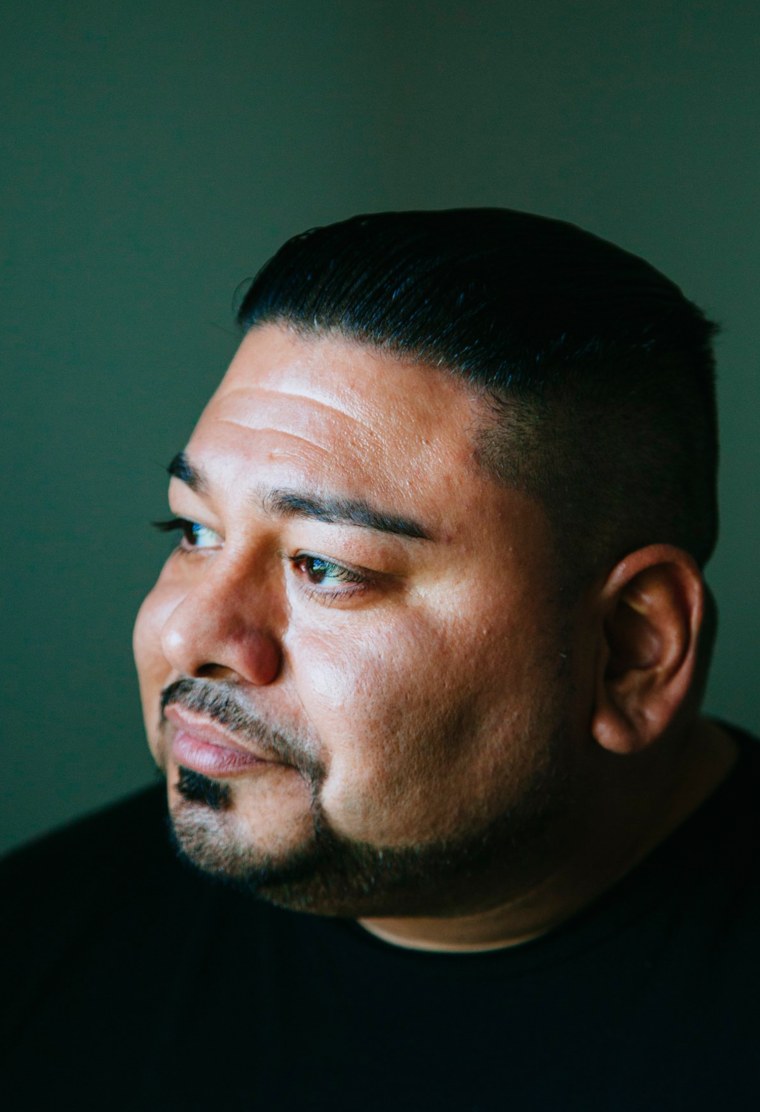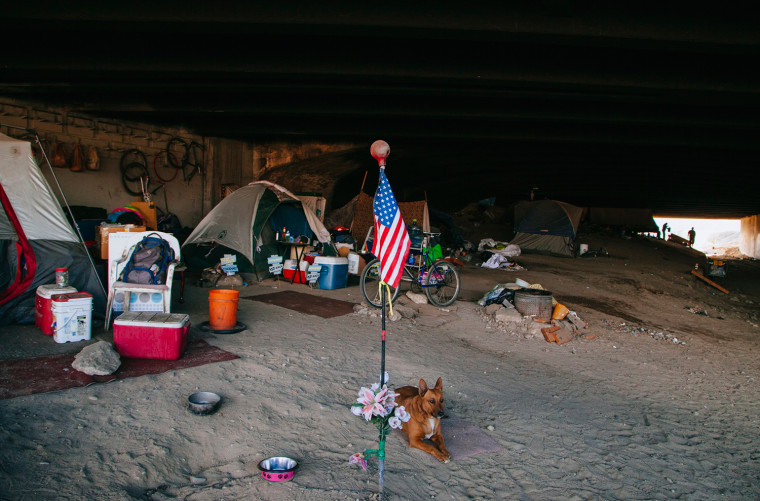LOS ANGELES – The Navy veteran keeps his few possessions in shipshape order. Hidden on a girder ledge, five cans of chicken-enchilada soup flank an alarm clock, a stack of hardcover mysteries and a plastic jug of water - half empty - scrawled with black marker to clearly designate ownership: "Bill's."
A few feet from the underbelly of the storm-drain bridge where Bill has lived since June, his perch holds whispers of daily survival and yesterdays lost. Above his bunk – a thin mattress long enough for a child – the cement wall is adorned with a 2013 calendar, a crucifix and three American flags.
On paper, Bill is one of 6,291 homeless veterans in Los Angeles – the highest number in any metro area – almost double the count in New York City (3,547), nearly five times the population in San Diego (1,486). Nationally, according to a fresh census released Nov. 21, Bill is one of 57,849 homeless veterans – a tally the Obama Administration has pledged to drive to zero by the end of 2015. Since 2010, a federal initiative has reduced that number by 24 percent, according to VA officials.
For now, the streets remain home for the holidays for tens of thousands of former military personnel.
“I still fold my clothes the way we were taught in boot camp,” says Bill, 52, who worked in the engine room aboard the USS Pensacola before earning an honorable discharge in 1981. For food, he gathers empty cans strewn beneath the power lines, selling them to a nearby scrap yard – about $60 per load. He comes from, he says, a middle-class family in Cleveland. He has been in drug rehab. He stayed clean for four years. He is using again. He lost his home after getting laid off by a local warehouse. He has a dog, Rascal. The pit bull always eats first.
“That animal is looking to me for sustenance, for emotional wellbeing. That gives me a sense of responsibility. In return, it helps me because there are times when I just want to sit down and cry for a minute,” Bill says. “Dogs don’t judge us like most people do.”
On Tuesday, he stood atop that bridge in sunshine, clutching Rascal’s leash as a U.S. flag snapped on a pole affixed to one rail. About 100 yards away, cars rolled past on the 605 Freeway, just east of Los Angeles. His green eyes were bloodshot red. Bill had just been handed a fresh bundle of cotton socks by a nonprofit group of ex-military members – the Vet Hunters – who use their military skills to ferret out homeless veterans then urge them to come in for shelter, linking them to employment, mental-health and substance-abuse professionals. (Bill would not allow his last name to be published, but the Vet Hunters say they verified his military record through the U.S. Department of Veterans Affairs).

Is the VA's ultimate goal of taking all homeless vets off the streets by 2015 attainable?
“I believe that through our daily actions and events, it helps bring us closer to seeing a day where the word ‘homeless’ will never be followed by ‘veteran,’ ” said Joe Leal, founder of the Vet Hunters and an Iraq combat veteran. He also works at the U.S. Army Reserve Center in El Monte, Calif., 13 miles east of L.A., helping to re-integrate homecoming soldiers. “We are working our butts off to help the VA meet their goal …
“Will 2015 be the year we end [veteran] homelessness? Well, to truly have that answer it will mean the economy will be back on track and all of our troops home,” Leal said. “Only then will we have a fighting chance.”
At many tent-dotted homeless camps in L.A, American flags are as common as heaps of weathered clothes, five-gallon jugs of water, and homemade cooking grates. Yet even in the urban scrub, there are islands of veterans forced deeper into isolation by their drug habits.
A few hundreds yards north of Bill’s tidy den, about five men and women live beneath another highway bridge that offers less cover but more heroin. The Vet Hunters ventured there as well last Tuesday, urging all members in their traveling party never to walk alone beneath that overpass. One rock was painted with the large letters “R.I.P” to mark the spot where someone recently overdosed, the Vet Hunters reported.
The homeless veterans huddling there have been “exiled” to that spot by people living in nearby shanties to keep the drugs out of their camps, the Vet Hunters reported.
From beneath that bridge, former Marine Jim Zukowski, 51, limped out with a squint to receive a critical donation: a lacquered walking stick. He has chronic disc disease in his back unrelated to his military service that makes standing difficult, he said.
“I got myself in this mess through addiction and depression. I just gave up. My old lady left me. I’ve got a bad back. I was drinking a lot. I got hooked. We're veterans. We're not supposed to be out here,” said Zukowski, who served from 1979 to 1983, and was based for a time at Camp Pendleton, Calif. He sleeps on a blanket atop sand softened by past rains.

After inspecting his new walking stick, he filled out an application – offered by the Vet Hunters – for a bed at the soon-to-be opened El Monte Veterans Village. It will contain 40 studio apartments and offices to help veterans connect to medical care, psychological attention, drug counseling and employment. It is scheduled to open in February of 2014.
The new housing allows the Vet Hunters to extend tangible hope – along with warm clothing and water packets – to ex-troops they meet. Any veteran is welcome to stay there, addicted or not, Leal said.
The question now: Will they willingly come out of the cold?
“I’m immune to this life. It’s been 11, 12 years out here,” Zukowski said, a fresh bruise over his right eye and a wool cap over his ears. He stood crookedly. “Always a Marine, that’s for sure. I’ve got maybe 10 good years left. But I don’t know. To each his own.”
Bill Briggs is a contributing writer for NBC News. Reach him on Twitter or send him an email.